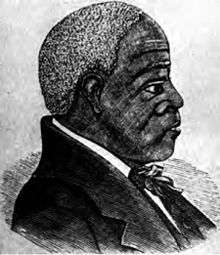Andrew Bryan (Baptist)

Andrew Bryan (1737–1812) founded First Bryan Baptist Church,[1] affectionately called the Mother Church of Black Baptists, and First African Baptist Church of Savannah in Savannah, Georgia,[2][3] the first black Baptist churches to be established in America.[4] Bryan was the former slave of Jonathan Bryan.[5]
Andrew Bryan was born in 1737 in Goose Creek, South Carolina, to slave parents. He married a woman named Hannah. Bryan converted to Christianity through the preaching of George Liele. After Liele left Savannah for a mission to Jamaica, Bryan began to preach. He was imprisoned twice for preaching to slaves, but he continued to do so. He was also severely whipped, but was noted for enduring the suffering as Jesus Christ had done.[6] Bryan established the church which would eventually become known as First African Baptist Church, and it grew from sixty-nine members in 1788 to about seven hundred by 1800.[7]
Notes
- ↑ Jeff (2009-05-13). "Thoughts and Theology: The Rev. Andrew Bryan 1737-1812". Thoughts and Theology. Retrieved 2016-08-20.
- ↑ "Africans in America: Andrew Bryan". WGBH Educational Foundation.
- ↑ Martin, Sandy Dwayne. "Andrew Bryan (1737-1812)". Georgia Humanities Council and the University of Georgia Press.
- ↑ "Africans in America: First African Baptist Church of Savannah". WGBH Educational Foundation.
- ↑ Alan Gallay (2007). The Formation of a Planter Elite: Jonathan Bryan and the Southern Colonial Frontier. University of Georgia Press. p. 52. ISBN 978-0-8203-3018-1.
- ↑ Davis, John W. (1918). "George Liele and Andrew Bryan, Pioneer Negro Baptist Preachers". Journal of Negro History. 3 (2): 119–127. Retrieved 2 November 2016.
- ↑ Williams, David S. (2008). From Mounds to Megachurches: Georgia's Religious Heritage. Athens: University of Georgia Press. p. 36. ISBN 0820336386. Retrieved 2 November 2016.